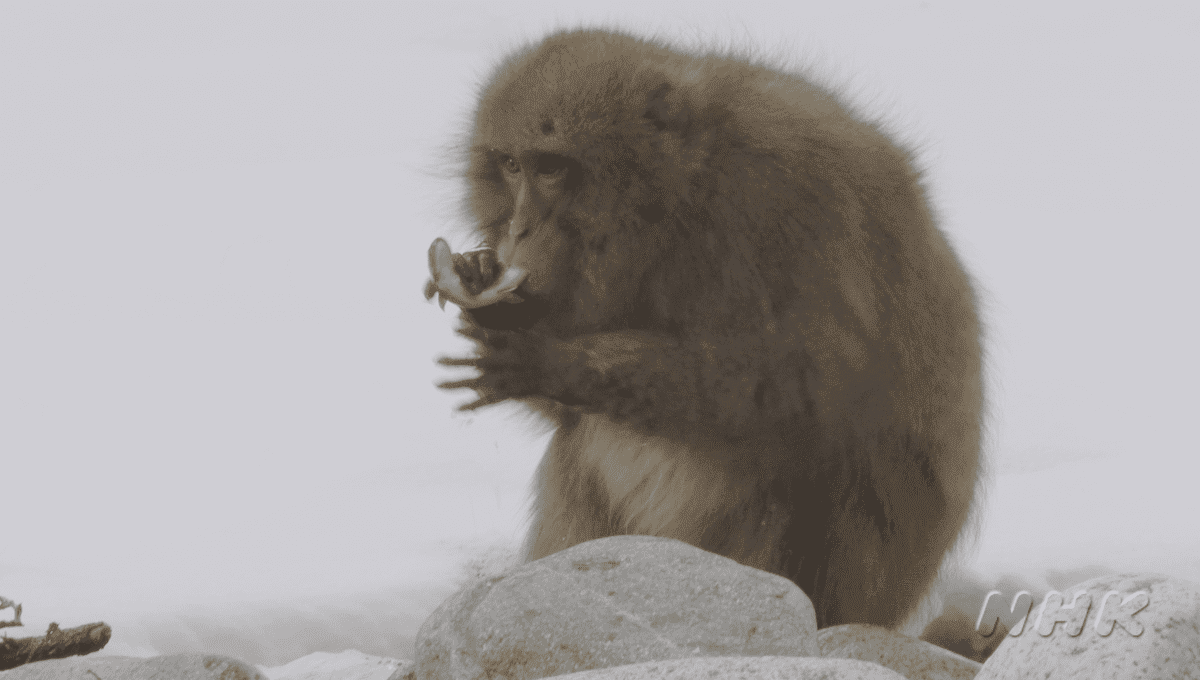
Japanese macaques have been directly observed catching and eating fish from a flowing river. This is the first time that any monkey has ever been seen fishing, and researchers believe the behavior may have evolved in a specific group of macaques as a means of surviving the freezing winters of the Japanese Alps.
“Japanese macaques, Macaca fuscata, of Kamikochi in the Japanese Alps endure one of the coldest and harshest environments during winter when scarcity of food puts them at risk,” explain the study authors. Typically, the monkeys feed on bamboo leaves and other woody plants during the annual freeze, although the Kamikochi region contains numerous streams fed by volcanic springs, which maintain a year-round temperature of 6°C (42.8°F) and do not freeze in winter.
Speculating that the aquatic organisms residing in these streams may help sustain the local snow monkey population when other food is scarce, the researchers spent three consecutive winters examining the contents of the monkeys’ poop. Sure enough, they found brown trout DNA in around 20 percent of the fecal samples, indicating that the macaques may have been eating fish.
Whether the monkeys actively caught live trout or merely scavenged dead fish, however, was unclear. To investigate, the researchers followed several troops of Japanese macaques along the banks of the Azusa River between January and March of 2022.
“We succeeded in observing the behavior of Japanese macaques catching active fish and consuming them potentially fourteen times, six times by direct observation and eight times with infrared sensor cameras,” write the study authors. “The data of camera traps included another six possible captures although this could not reliably be confirmed as fish.”
“In addition to these successful fishing behaviors, we also observed several failed attempts when Japanese macaques reacted to the sound of fish splashing in the water,” they say.
Describing the crude methods used by the monkeys to catch their aquatic prey, the researchers explain how the animals chased fish through shallow waters before holding them down with both hands and biting them.
“Having obtained evidence that Japanese macaques in the Kamikochi catch and eat live fish, the next step for us in this research was to investigate how these fish-eating behaviors spread within the macaque group,” explained study author Koji Tojo in a statement. “Is it genetic? Is it a kind of culture that can be transmitted within the group?”.
Though the researchers hope their ongoing observations will provide the answers to these questions, they speculate that the behavior probably evolved in stages as the macaques gradually began exploiting the river for food during winter. According to their theory, the monkeys likely started out by foraging aquatic plants, which would have resulted in the inadvertent consumption of aquatic insects living amongst this vegetation.
Over time, the macaques may have started deliberately seeking out these river bugs, learning to overturn rocks and catch flowing insects. This, in turn, may have provided them with the skills to hunt fish.
“We speculate that acquiring the behavior of catching the flowing aquatic insects may have become a pre-adaptive behavior to catching swimming fish,” write the authors. “In fact, since the behavior of catching flowing aquatic insects was observed frequently in this study, it is very likely that the behavior of catching of fish first occurred accidentally.”
The study is published in the journal Scientific Reports.
Source Link: First-Ever Footage Shows Snow Monkeys Fishing In Japan